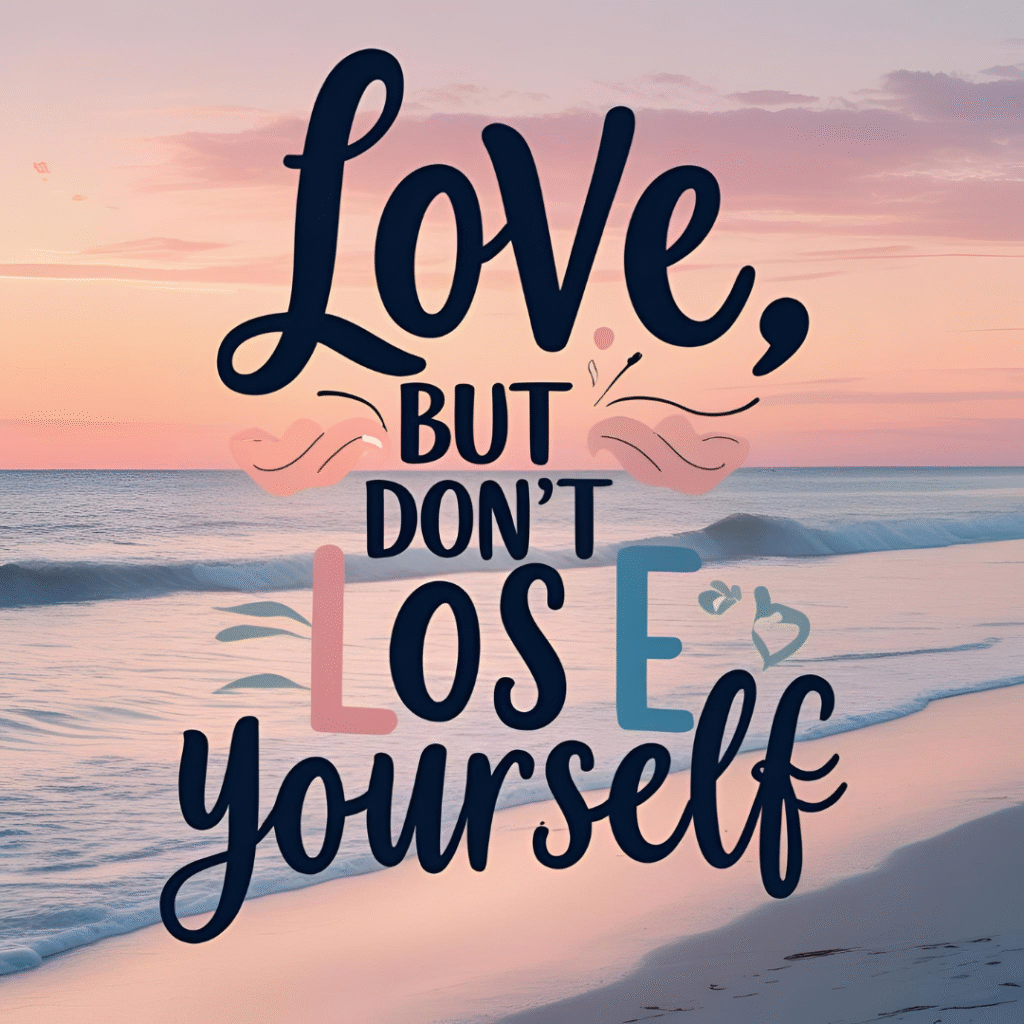In the early stages of love, everything feels exciting. You want to spend every moment with your partner, share all your thoughts, and be part of every little detail of their life. It feels amazing—and totally normal. But sometimes, that deep, intense love can slowly turn into something unbalanced. Without even realizing it, you might start giving too much of yourself, putting your partner first in every situation, and losing sight of who you are.

And while love is a beautiful thing, it should never make you feel smaller, invisible, or like you’re disappearing into the background of your own life.
Let’s talk about what happens when you love someone too much, how to recognize the signs, and how to build a healthier, more balanced relationship—without losing your heart in the process.
The good news? You can fix it.
You might not notice it right away. Maybe it started as checking in often, helping out with every little thing, or being available 24/7. But if your life starts to revolve around your partner and their needs—while your own take a back seat—that’s when the imbalance begins.
It’s easy to mistake this kind of over-involvement as deep love or care. But sometimes, what feels like love can actually become a kind of emotional dependency or control. And that can slowly start to push your partner away.

Are You Smothering Your Partner?
If you’re wondering whether you’re loving your partner a little too much, here are some signs to watch for:
1. They’ve Become Your Whole World
You find yourself constantly texting or calling them. You want to know where they are, what they’re doing, and who they’re with. You cancel your own plans just to be with them—even if they didn’t ask. You crave their attention all the time and feel uneasy when they’re not around.
What it feels like to you: caring and attentive.
What it might feel like to them: clingy and overwhelming.
2. You Try to Control Everything
Do you get anxious when they do something without you? Do you feel the need to make every decision, or get upset when they make plans that don’t include you? Maybe you check their phone, ask too many questions, or feel uneasy if they want time alone. These behaviors often come from fear—not love.
What it feels like to you: protective and involved.
What it might feel like to them: controlling or suffocating.
3. You’ve Lost Touch With Yourself
You’ve stopped seeing your friends. You don’t do the things you used to enjoy. You can’t remember the last time you focused on your own goals or dreams. Everything you do now seems to revolve around your partner.
What it feels like to you: dedicated and loving.
What it really is: a sign that you’re disappearing into the relationship.
Remember:
Healthy love means balance. Give your partner (and yourself) room to breathe.
What Happens When You Love Someone Too Much
Even if your intentions are good, loving someone too much—without balance—can lead to some painful consequences.
1. They May Start Taking You for Granted
If you’re always giving and never asking for anything in return, your partner might start expecting it. Over time, they might stop appreciating the little things you do. They might even stop trying altogether, because they know you’ll always be there no matter what. And that can leave you feeling invisible or used.
2. You Can Become Too Dependent
When your happiness starts to depend entirely on your partner, it creates an unhealthy kind of reliance. You might stop making your own choices, lose confidence, or feel empty when you’re alone. And if the relationship ever ends, it can feel like your whole world has fallen apart—because you’ve built your identity around them.
3. You Might Forget Who You Are
Maybe you once loved painting, hanging out with friends, or going for long walks alone—but you don’t do those things anymore. You’ve changed your personality, hobbies, or even your values just to make the relationship work. And slowly, you stop recognizing yourself.
Love should help you grow into the best version of yourself—not make you shrink to fit into someone else’s life.
4. You Stop Growing
When all your energy goes into someone else’s dreams and none into your own, your personal growth suffers. Maybe you gave up a career move, turned down a new opportunity, or let go of a goal you once had. And while sacrifice is part of any relationship, it shouldn’t come at the cost of your future.
5. You Might End Up Hurt
At some point, you’ll realize you’ve been giving more than you’re receiving. And that can leave you feeling unappreciated, alone, and even resentful. No one deserves to feel like their love is one-sided.
How to Love Without Losing Yourself

The good news? You can absolutely love someone deeply without losing your own identity. It just takes a bit of awareness, some healthy habits, and a strong dose of self-love.
Here’s how:
1. Set Boundaries That Protect Your Well-Being
Boundaries are not about pushing people away—they’re about keeping yourself emotionally safe. Take time to understand what you want and need in a relationship. What makes you feel respected? What crosses the line?
Let your partner know how you’d like to be treated, and don’t be afraid to say “no” when something doesn’t feel right.
2. Make Time for Yourself
You don’t have to be available all the time. Spend time doing things that make you happy—whether that’s going for a walk, reading a book, spending time with friends, or diving into a personal project. The more fulfilled you are outside the relationship, the stronger and more confident you’ll be within it.
3. Trust Instead of Cling
Love should be built on trust, not fear. If you find yourself needing constant reassurance or worrying about losing your partner, take a step back and ask yourself why. Is it something they’re doing—or something within yourself that needs healing?
Work on building trust, both in your partner and in yourself. Trust allows both of you to breathe, grow, and thrive together.
4. Keep Your Support System Strong
Don’t isolate yourself. Your friends, family, and support network are important—even when you’re in love. They know who you are and can help remind you of that when you forget. Make time to connect with them regularly. You’ll feel more balanced, grounded, and emotionally supported.
5. Choose Mutual Respect Over Control
Instead of trying to manage everything your partner does, focus on open communication. Let them know how you feel, but also listen to what they need. A healthy relationship isn’t about one person leading and the other following—it’s about walking side by side.
6. Focus on Growing Together, Not Just Giving
A great relationship helps both people grow. Encourage each other to chase dreams, try new things, and keep becoming better versions of yourselves. Support each other, but don’t forget to support your own growth too.
Final Thought: Love, But Don’t Lose Yourself

Real love is about balance. Both people should give, grow, and feel supported. If you’re always giving and not getting much back, it starts to wear you down. So love with your whole heart—but keep a little room for yourself too. Because the healthiest relationships happen when both people feel whole, not half.



